The Truth Behind Social Media Support of Ken Paxton
The authenticity of tweets critical of Ken Paxton's impeachment is impossible to discern.

Scorecard Confessions has uncovered Texas Scorecard's Axis of Allies' (aka 'The Enterprise') nefarious tactics to further deceive the public. Deception and gaslighting have become their favored weapons in the quest to shield Texas Attorney General Ken Paxton from accountability.
In the lead-up to Paxton's impeachment, Texas Scorecard's Axis of Allies' engaged in a clandestine operation, funneling exorbitant sums of money to defend Paxton and tarnish the reputations of members who voted to hold him accountable. Today, Scorecard Confessions will expose their most deceitful and manipulative tactic yet: the utilization of fake outrage.
The impeachment proceedings against Paxton prompted a wave of social media activity, with numerous national figures expressing their outrage over the overwhelming vote by the Texas House of Representatives. The sheer scope of the condemnation and the show of support for Paxton nationwide caught many by surprise. It appeared as if Paxton, vaguely known on a national scale, had gained an unprecedented level of popularity and favor. However, Scorecard Confessions can now confirm that this surge of support is far from genuine; it is a façade financed by the Texas Scorecard's Axis of Allies to deceive the public and distort reality. Their aim is to gaslight not only their fellow citizens but also elected officials.
The New 'Secret Weapon' of The Enterprise
In May, Defend Texas Liberty PAC made a significant payment of $18,000 to a little-known firm called Influenceable, which specializes in orchestrating "Swarm Campaigns."
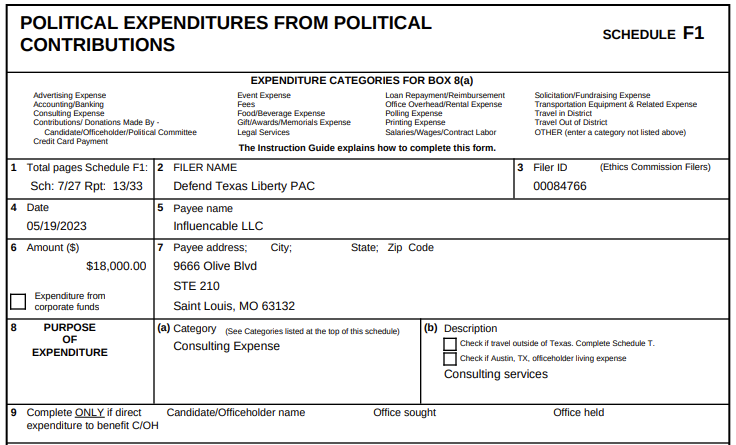
Who runs Influenceable?
Artemii Korshunov, a young man at the helm of Influenceable, is the focus of growing speculation and concern. His online presence provides intriguing clues that suggest a connection to Russia, raising questions about the true motives of the agency.

A closer examination of Korshunov's Facebook activity reveals a pattern of engagement with Russian-speaking individuals. Comments left in Russian language, along with interactions and discussions in Russian, punctuate his posts.

Multiple social media posts provide evidence of his frequent travels to Moscow, showcasing images from both 2016 and 2019:


Based on media coverage of the location's opening and a post on Twitter by an unidentified individual, Scorecard Confessions has corroborated the presence of this Shake Shack location in Moscow. The external appearance of the store has been confirmed through the provided evidence.
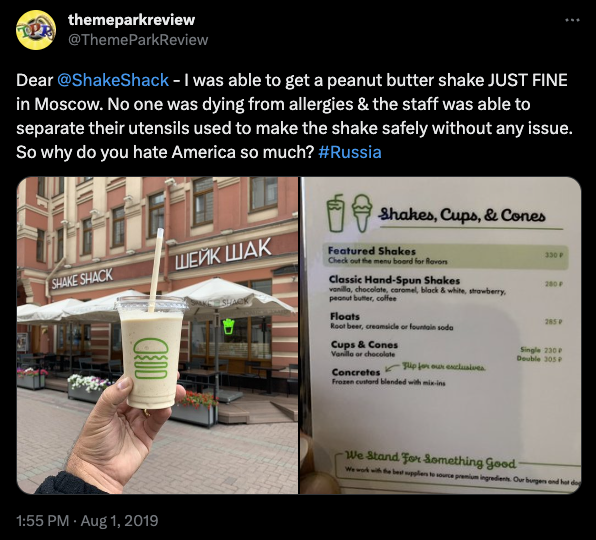
Korshunov's LinkedIn profile highlights his fluency in Russian, while his Instagram account identifies him as a co-founder of the platform, with references to his involvement in its development.
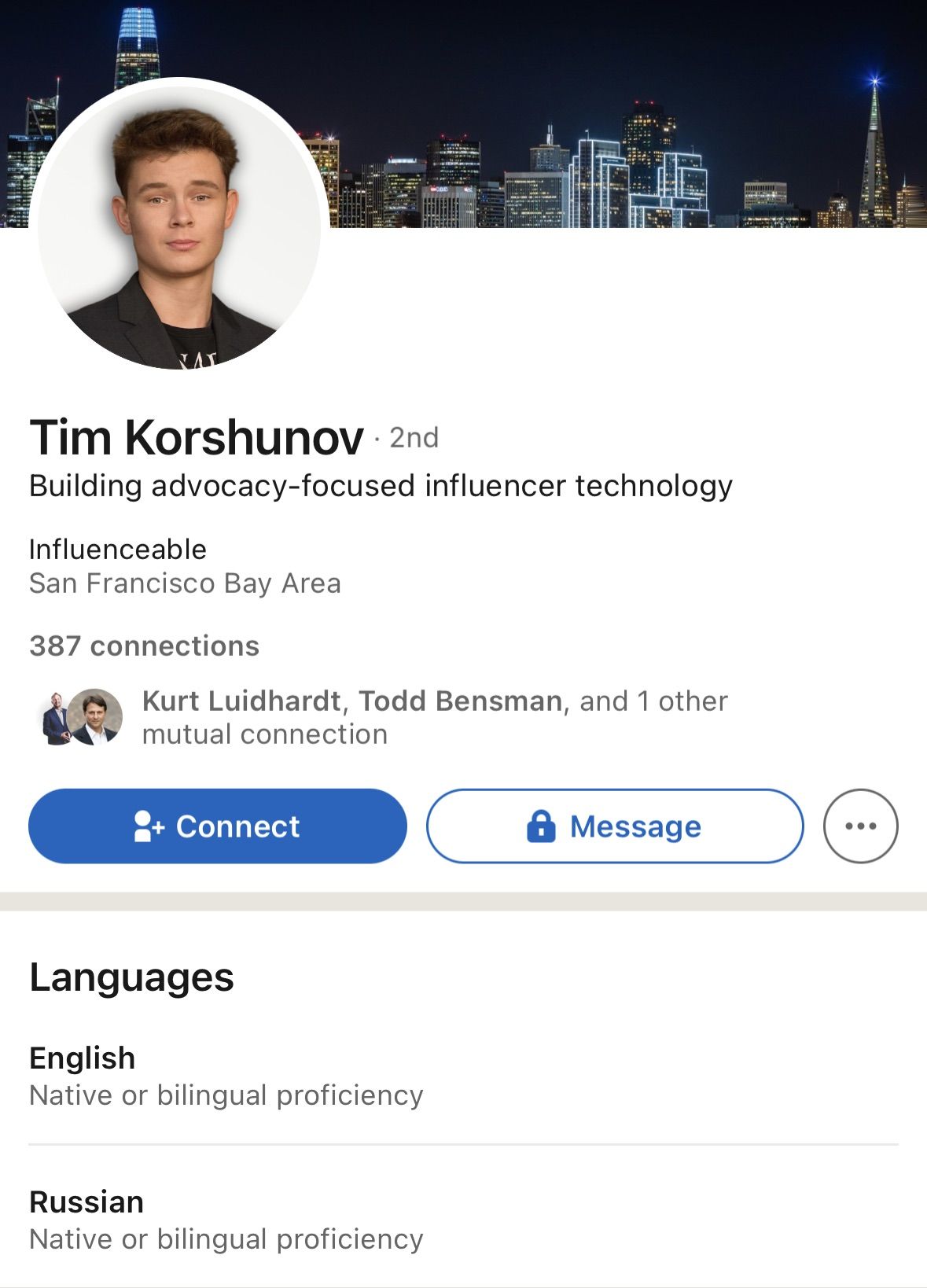

Korshunov's fluency in Russian, as indicated on his LinkedIn profile, adds an additional layer of intrigue to the investigation. It raises concerns about his potential ties to Russian-speaking individuals or organizations, particularly in light of Influenceable's operations. Given the ongoing concerns surrounding Russian election interference and disinformation campaigns, the ability to effectively communicate in Russian raises serious questions about the nature of Influenceable's partnerships and their potential involvement in such activities.
What are Swarm Campaigns?
In simple terms, Swarm Campaigns involve bombarding social media networks with coordinated content, deploying multiple individuals to echo the same messages and express nearly identical sentiments. Traditionally, these campaigns relied on volunteers sharing posts and encouraging retweets or comments. However, Influenceable takes a different approach. They pay Z-list "influencers" fees ranging from $50 to $200 to promote specific tweets, providing them with clear instructions on how to endorse them.
Here's a glimpse into the mechanics of this deceptive scheme:
- A client of Influenceable sends a tweet they wish to promote to a designated staff member, specifying the members of their network who should disseminate it.
- Influenceable then contacts the selected individuals within the network via text message, issuing precise instructions. Below is an example that has been confirmed to be accurate by sources familiar with Influenceable's process:
JOB: Like and retweet this post, followed by a quote retweet showering it with praise!
PAYOUT: $50
DUE DATE: IMMEDIATELY
- Within minutes, the "influencers" dutifully comply with the provided instructions, promptly confirming their completion of the task and eagerly awaiting their monetary compensation.
To further illuminate the coordinated nature of this deception, one only needs to examine a sample of posts by these "influencers." It becomes apparent that within the span of an hour, numerous posts with strikingly similar video content inundate social media platforms.
The striking uniformity of supportive tweets, accompanied by videos in which individuals passionately denounce the impeachment of Ken Paxton, begs a few questions: What are the odds that such posts would emerge organically, without any external influence? Could it be a remarkable coincidence that people from different corners of the country express eerily similar sentiments mere minutes from one another using an identical template?
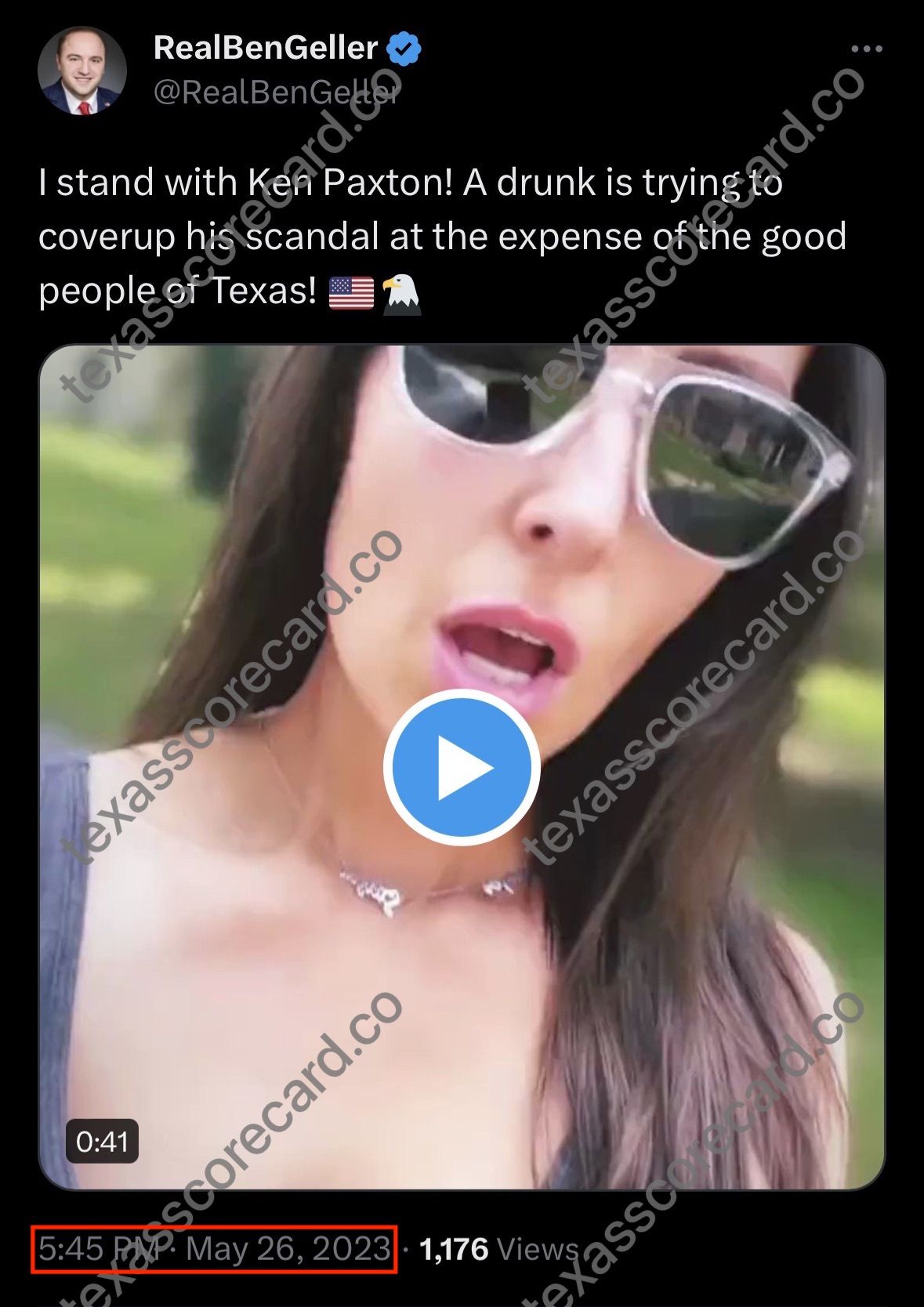
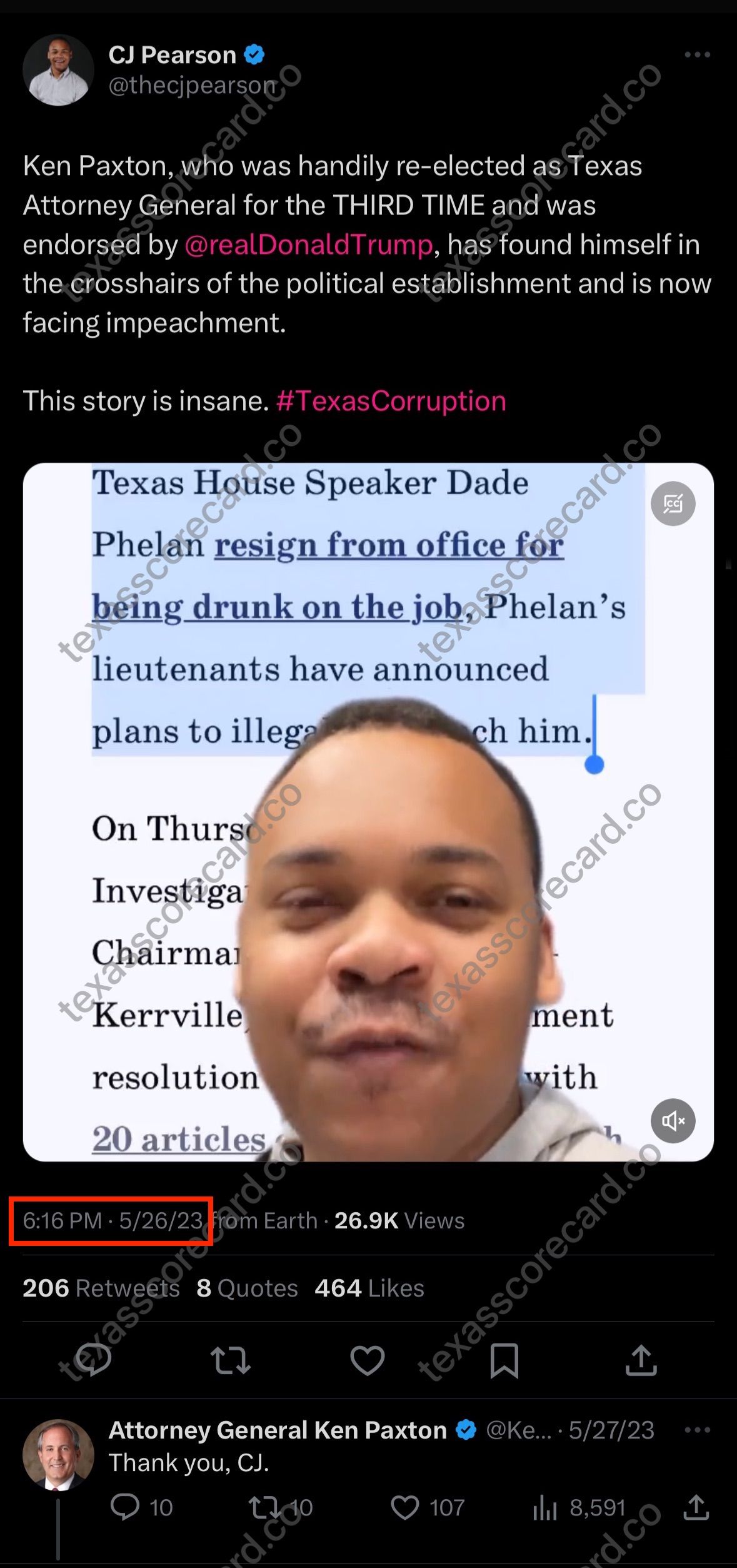
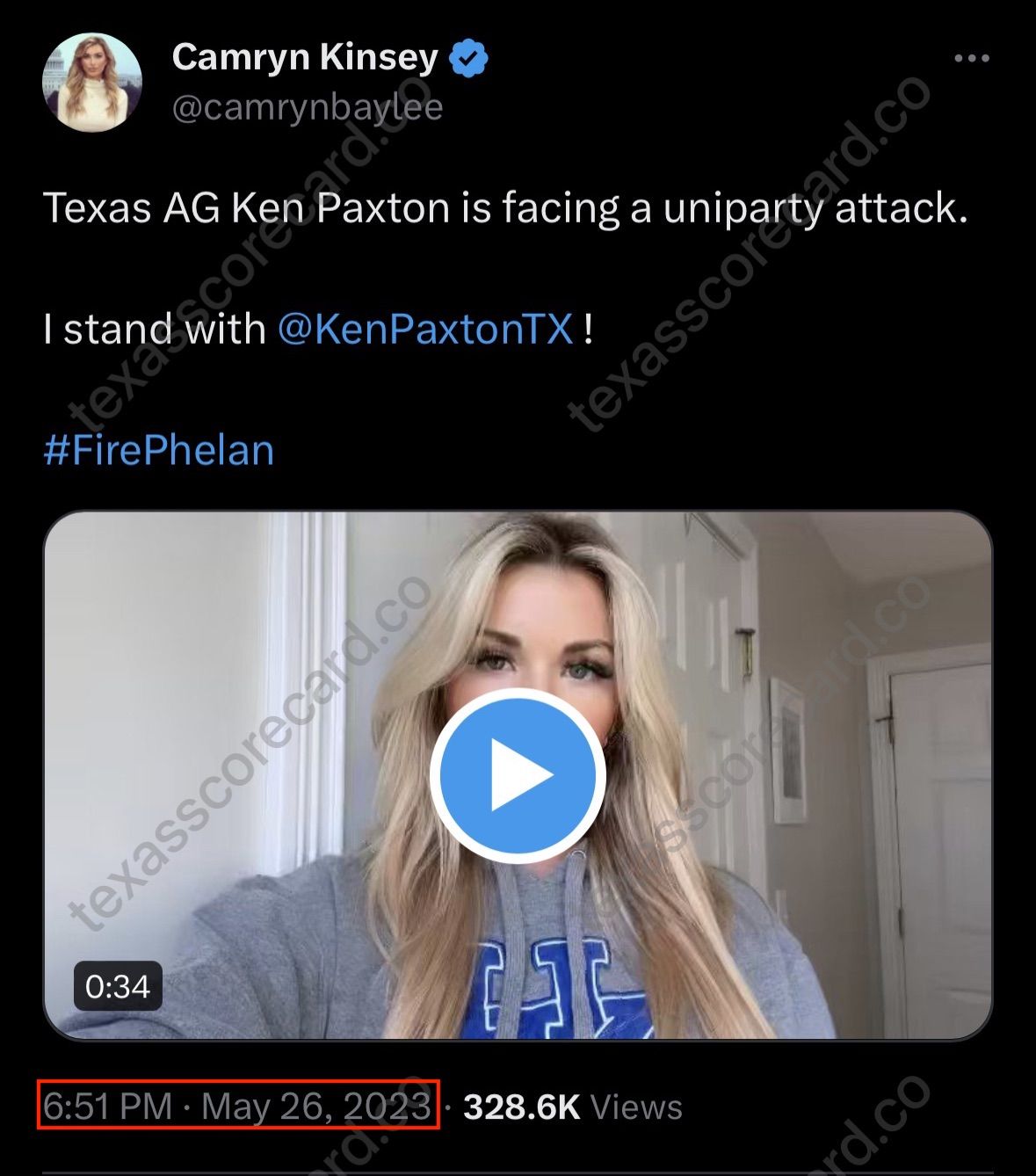
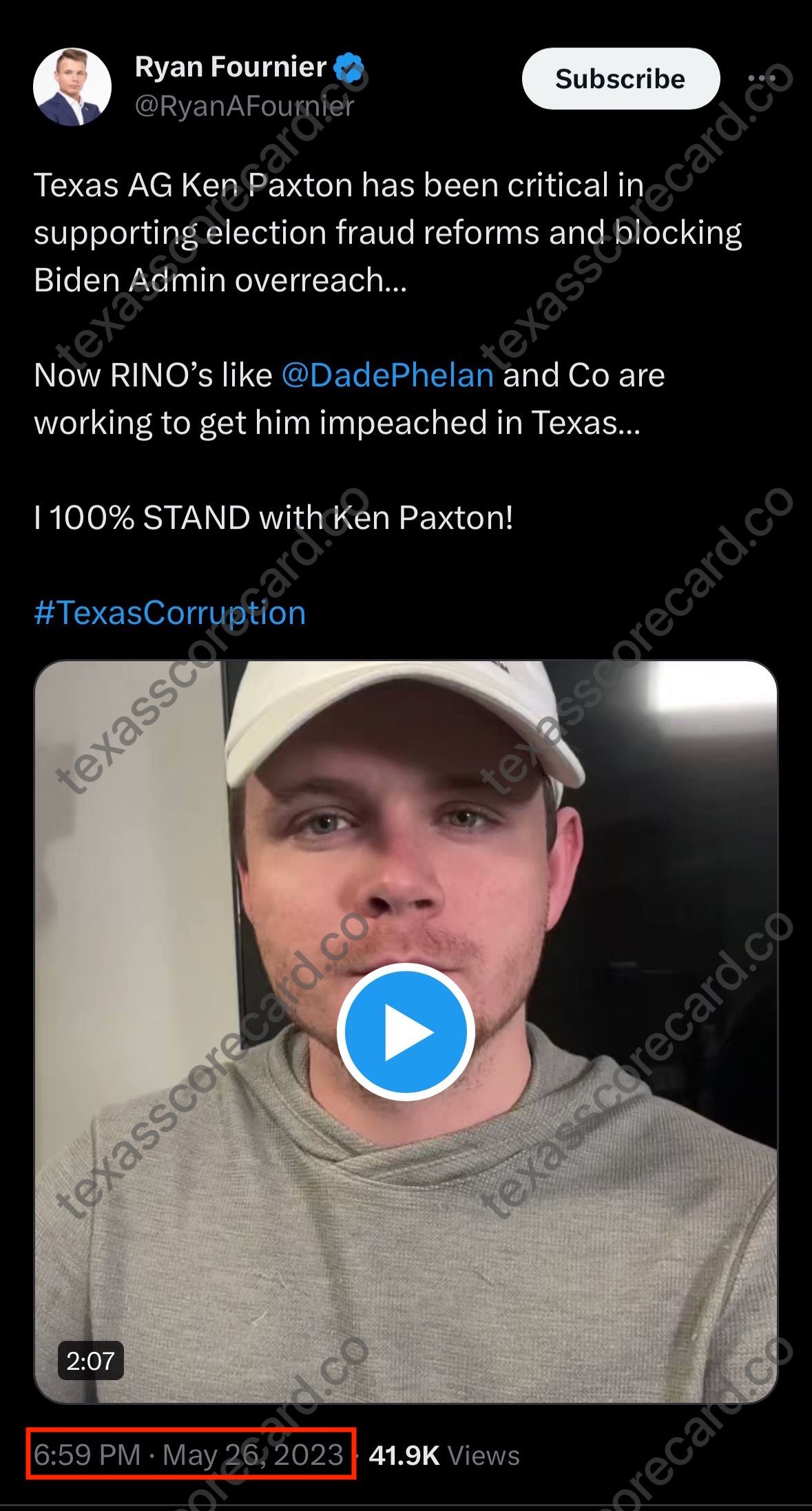
Influenceable's Calculated Lack of Transparency
The most duplicitous aspect of Influenceable's business model lies in its deliberate lack of transparency. The company is well aware that if the public were to discover that the seemingly organic tweets were actually meticulously crafted to serve their paying clients' agendas, their credibility would crumble. As a precaution, Influenceable forces its "influencers" to sign non-disclosure agreements, effectively silencing them from acknowledging their involvement in disseminating deceptive social media content.
The Enterprise Connection
Last month Influenceable's Artemii Korshunov shared a revealing photo featuring three individuals:
Tim Dunn, a prominent funder of Defend Texas Liberty PAC and The Enterprise.
Sean Feucht, a self-proclaimed Christian nationalist minister, known for willfully trespassing on properties, refusing to seek permits on government premises, and then manipulating his followers by presenting himself as a victim of Christian persecution.
Feucht shares a common belief in Dominionism with Farris Wilks, a significant financier of The Enterprise.
Brad Parscale, former campaign manager for President Donald Trump. Parscale, since his highly publicized bout of intoxication, has launched multiple web services designed to organize, create, and amplify the efforts of individuals seeking to deceive the public. Some of Parscale's platforms are listed as partners on Influenceable's website.
In 2018, Parscale declined to divulge information about his "secret weapon" and its potential connection to Russia's interference in the 2016 election.
From POLITICO:
Even as digital media guru Brad Parscale takes over President Donald Trump’s reelection campaign, federal investigators have mounting questions about the high-tech “secret weapon” Parscale says was instrumental to Trump’s 2016 victory — including whether it might have played a role in Russian election meddling.
But Parscale isn’t talking.
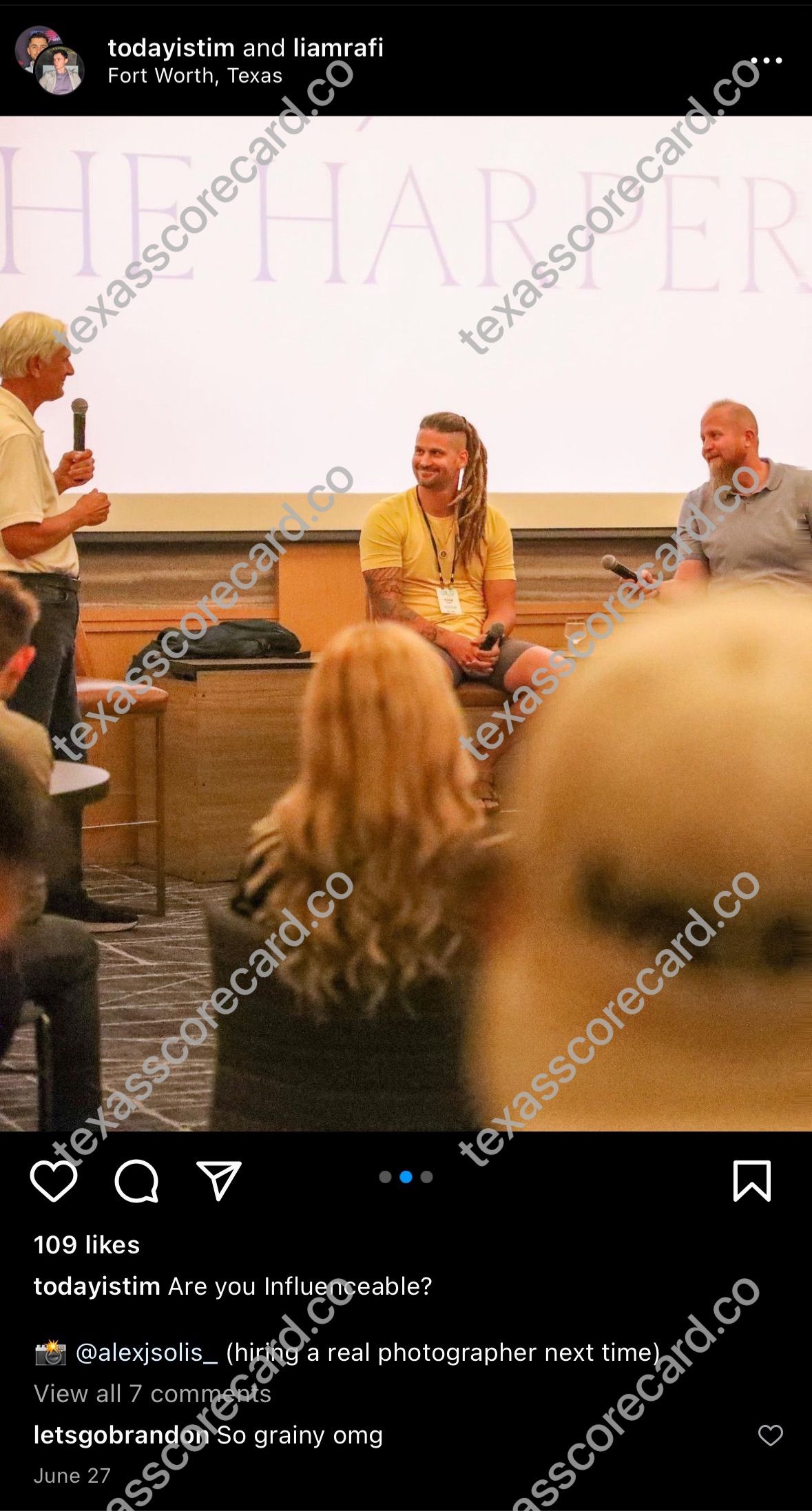
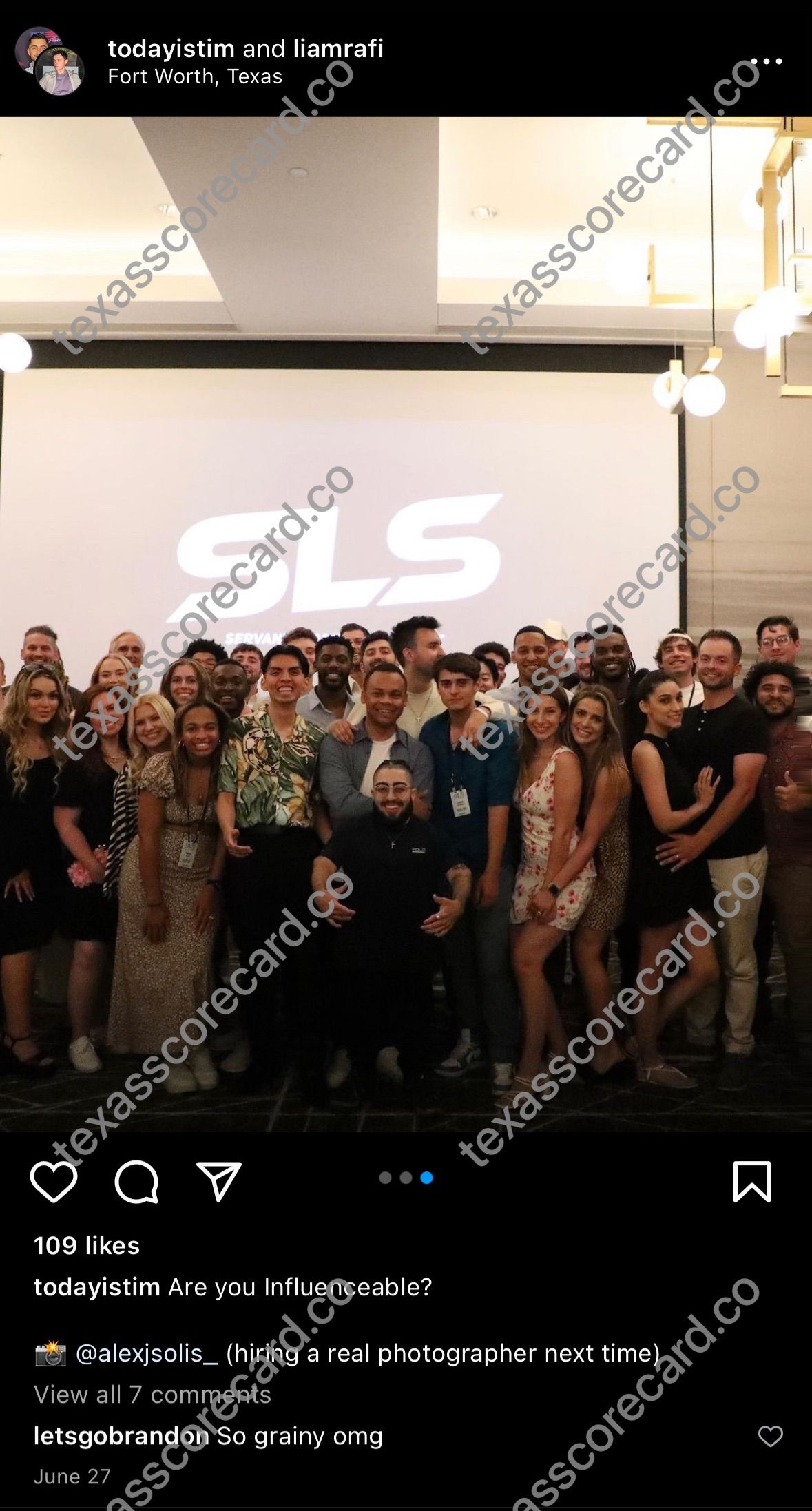

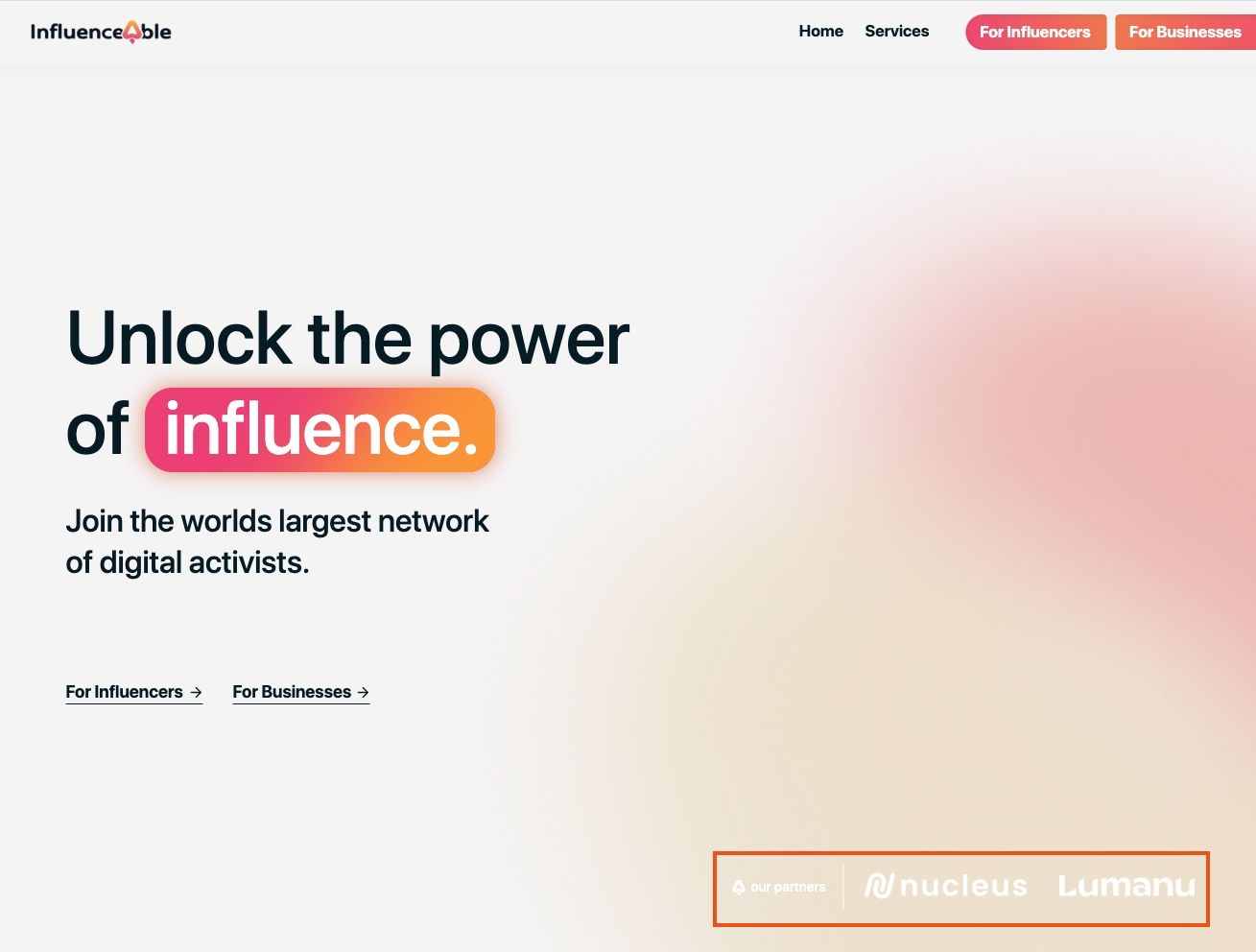
Unmasking Influenceable's Network
As the investigation into Influenceable deepens, a web of connections begins to emerge, shedding light on the individuals involved in promoting deceptive tweets. Among the "influencers," one name stands out prominently—C.J. Pearson, who is featured on Influenceable's website.
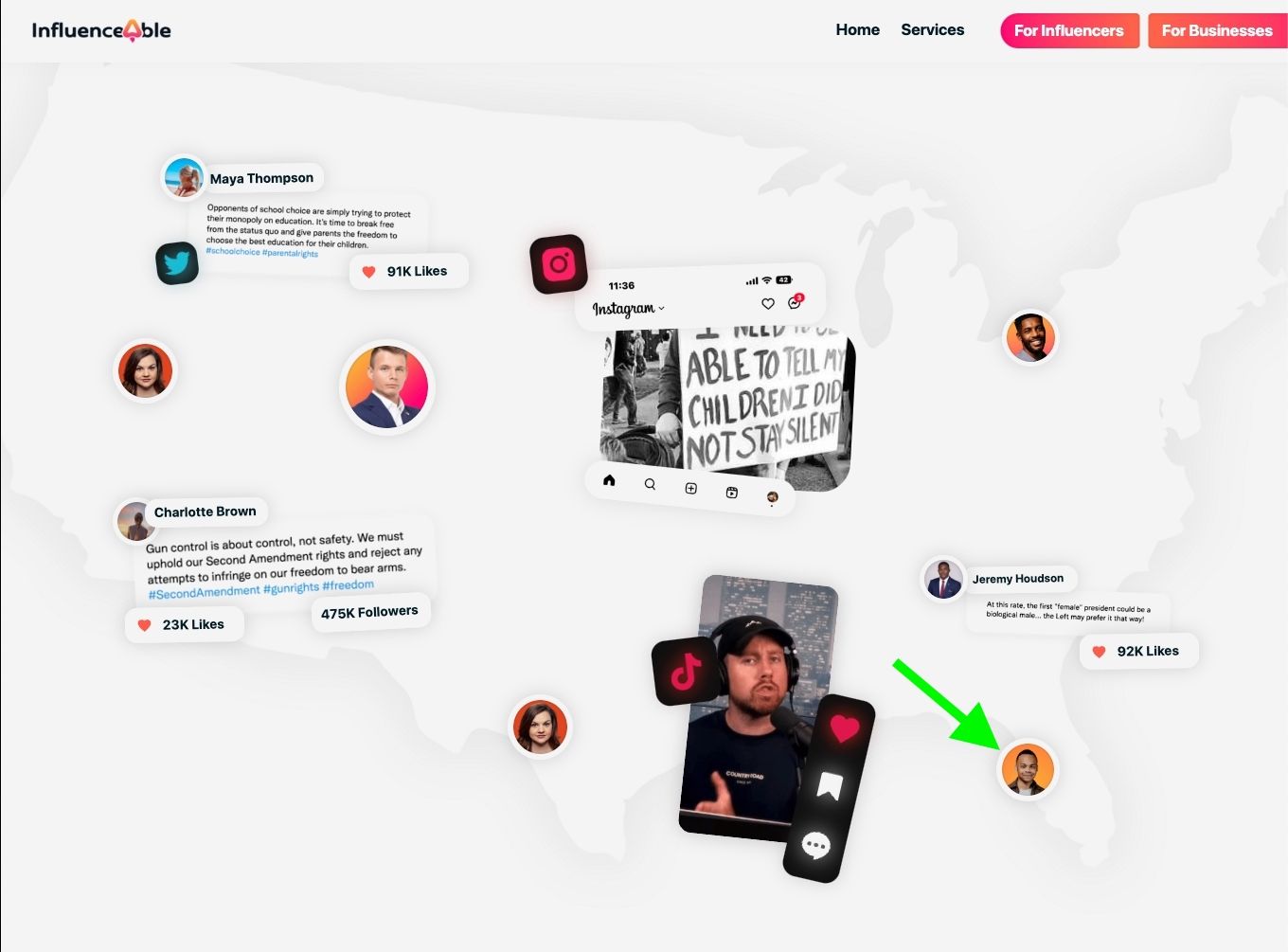
C.J. Pearson has long been a close associate and trusted ally of Ali Alexander, the self-proclaimed organizer behind the January 6th insurrection and an individual accused of soliciting nude images from underage boys.
Interestingly, during the planning stages of the January 6th insurrection Ali Alexander was collaborating directly with Caroline Wren. Wren, known as the campaign manager for Kari Lake's unsuccessful bid for Arizona Governor, was also involved in Harmeet Dhillon's campaign for RNC Chairwoman. These connections suggest a tightly-knit network working together.
In a revealing testimony before the January 6th Committee, Wren admitted to being in direct contact with Ken Paxton. This revelation suggests a potential link between Influenceable, Texas Scorecard's Axis of Allies, activists involved in the insurrection, and "influencers" promoting deceptive content to protect Ken Paxton.
Adding another intriguing piece to the puzzle, Matt Rinaldi, a devoted minion of The Enterprise, openly endorsed Harmeet Dhillon's bid for RNC Chair, further cementing the interconnectedness of key players in this complex web of influence.
Another noteworthy connection comes to light through Harmeet Dhillon's employment of an attorney who is married to the sister of Ben Shapiro, a prominent figure associated with the conservative media outlet, DailyWire. Farris Wilks, a key financier of The Enterprise, is the sole investor in DailyWire. Wilks' connection to Dhillon, creates another link between the influencers and the actors involved in promoting deceptive content.
Was Defend Texas Liberty PAC's payment to Influenceable Legal?
It is imperative to scrutinize these connections, as they raise serious concerns about potential ethics violations and the subversion of democratic processes. Defend Texas Liberty PAC's payment to Influenceable, made during a political donation moratorium, raises suspicions of a violation of Texas Campaign Finance laws.
Texas Election Code states the following:
Sec. 253.034. RESTRICTIONS ON CONTRIBUTIONS DURING AND FOLLOWING REGULAR LEGISLATIVE SESSION.
(a) During the period beginning on the 30th day before the date a regular legislative session convenes and continuing through the 20th day after the date of final adjournment, a person may not knowingly make a political contribution to
(1) a statewide officeholder;
(2) a member of the legislature; or
(3) a specific-purpose committee for supporting, opposing, or assisting a statewide officeholder or member of the legislature.
(b) A statewide officeholder, a member of the legislature, or a specific-purpose committee for supporting, opposing, or assisting a statewide officeholder or member of the legislature may not knowingly accept a political contribution, and shall refuse a political contribution that is received, during the period prescribed by Subsection (a).
The clear intention behind this expenditure was to effectively provide in-kind contributions to Ken Paxton, raising serious questions about the legality of such actions.
Far-right Figures Speak Out
Individuals on the far-right and grassroots activists have begun calling out Texas Scorecard's Axis of Allies for their public manipulation. Former Texas State Senator Konni Burton has actively highlighted their underhanded tactics through numerous tweets.
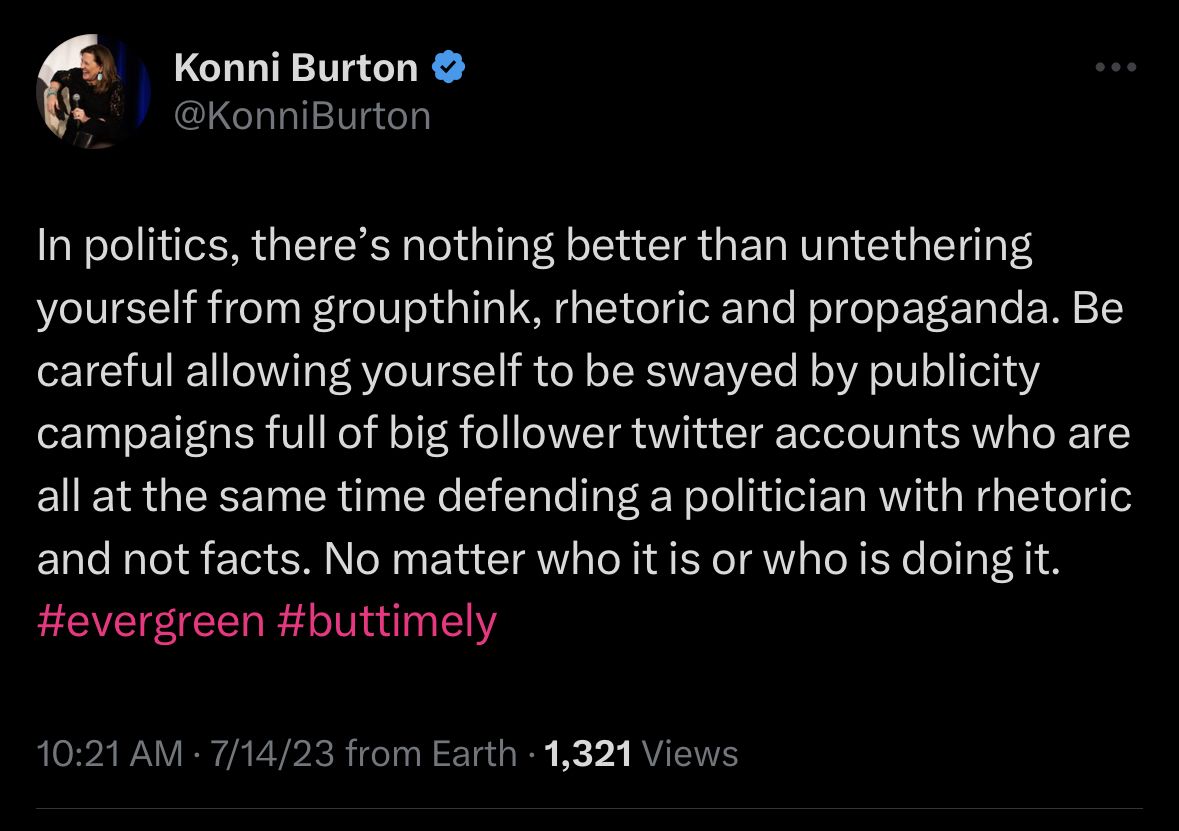
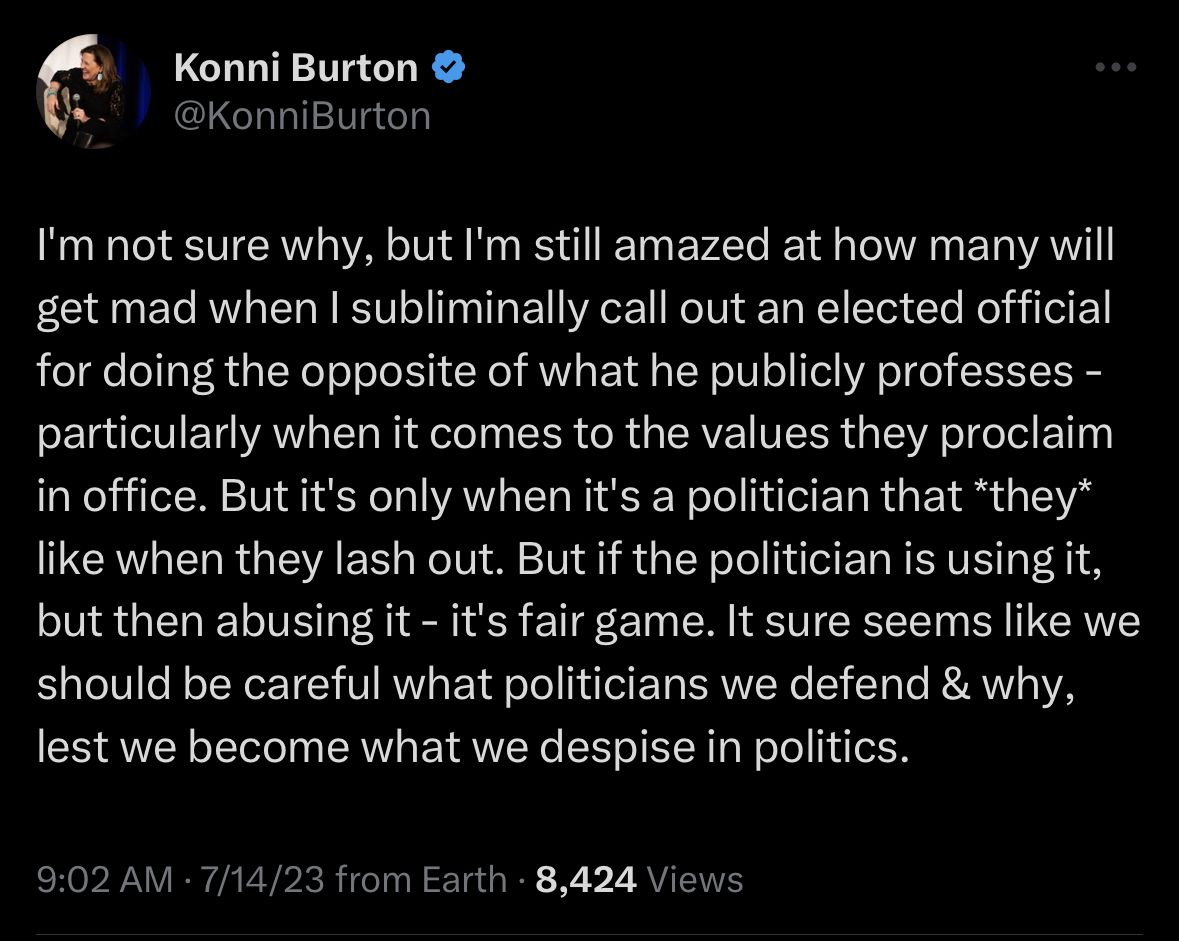

Current Texas Scorecard Readers Find Their Deceptive Tactics Revolting
The website Current Revolt conducted a poll on Twitter, with an overwhelming majority voting in favor of requiring disclosure for bought and paid-for tweets in the interest of transparency.
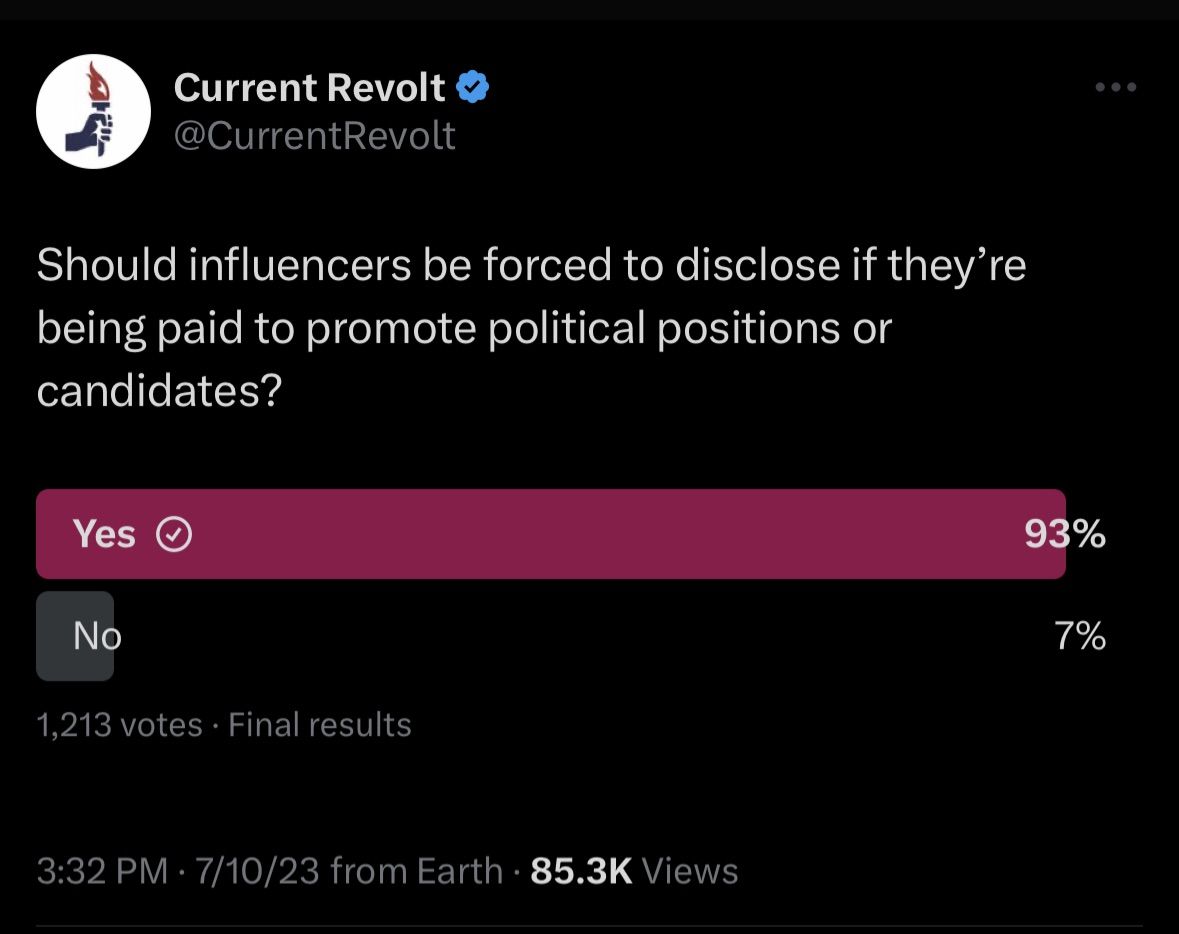
The poll carries significant implications as it reveals a noteworthy sentiment among an audience similar to Texas Scorecard. The majority of participants in the poll expressed a clear desire for transparency, indicating they do not want to be deceived by the false perception of "organic" posts that are, in reality, bought and paid for.
Tony Tinderholt Revealed The Underhanded Playbook of The Enterprise
Representative Tony Tinderholt unintentionally exposed the underlying belief on which Texas Scorecard's Axis of Allies relies: that perception equates to truth for the individual perceiving it, regardless of actual facts.
"The Grassroots"
The term "the grassroots" has been perverted by Texas Scorecard's Axis of Allies, employing it as a convenient tool to mislead. They audaciously portray David Covey as a champion of "the grassroots," even though their own standards reveal his opportunism and deceitful flip-flopping. As previously exposed by Scorecard Confessions, The Enterprise—linked to Texas Scorecard—holds substantial financial stakes in numerous elected officials. However, they conceal this cozy relationship, hijacking the term "the grassroots" to refer solely to individuals they financially support.
From Scorecard Confessions Report On June 8:
To further deceive the public and maintain an illusion of "the grassroots" support, The Enterprise fabricates sham organizations that masquerade as genuine movements of "the grassroots". Examples of these deceptive entities include True Texas Project, Texas Right to Life, Defend Texas Liberty PAC, Texans for Fiscal Responsibility, and countless others. These fake grassroots organizations are designed to appear organic and community-driven, but they are nothing more than carefully crafted facades. Their purpose is to trick unsuspecting voters into believing they are supporting candidates backed by the true will of the people. However, the reality is that Stickland and The Enterprise are the ones pulling the strings from behind the scenes at the direction of Tim Dunn and the Wilks Brothers.
The utilization of Influenceable is just another tactic employed by Texas Scorecard's Axis of Allies to construct a false perception of reality, deluding their audience into believing whatever serves their purposes. In this instance, they craft a fabricated reality in which Z-list far-right influencers appear genuinely outraged by Ken Paxton's impeachment, despite having to pay them to gaslight the people of Texas.
Violating Twitter's Community Standards: Influenceable's Potential Breach of Political Advertising Guidelines
Twitter's community standards regarding political advertising are designed to ensure fairness, transparency, and compliance with legal requirements. These guidelines specifically restrict certain types of content and define the permissible channels for promoting political campaigns on the platform. In the case of Influenceable's activities, there are indications that their content publishing practices could potentially violate these standards.
According to Twitter's political advertising regulations, foreign nationals and non-U.S. entities are explicitly prohibited from targeting political ads to the United States. This restriction serves to safeguard the integrity of U.S. elections and prevent undue foreign influence. As Influenceable's operations and its association with Artemii Korshunov, who has ties to Russia, come under scrutiny, concerns arise regarding potential violations of this guideline. By directing their efforts towards U.S. citizens, Influenceable's actions directly contravene the guidelines set by the platform.
Furthermore, Twitter stipulates that political campaigning ads may only be promoted through specific ad formats, namely Promoted Ads and Follower Ads. This limitation ensures that political content is clearly identified as advertising, helping users distinguish it from organic, non-promoted content. By utilizing paid influencers to disseminate political messages without explicitly labeling them as promotional, Influenceable's practices run afoul of Twitter's guidelines. Such actions not only undermine transparency but also raise doubts about the authenticity and intentions behind the content being shared.
Eliciting Elon Musk's Ire
Recent reports indicate that Twitter's advertising revenue has experienced a significant decline, plummeting over 59%. Against this backdrop, the discovery of The Enterprise's potential circumvention of Twitter's advertising guidelines and lost revenue is unlikely to sit well with Musk.
The Tweeted Mirage: Distrusting Critical Narratives About Ken Paxton's Impeachment
Amidst the ongoing debate surrounding Ken Paxton's impeachment, a deeply troubling realization emerges—one that shatters any semblance of authenticity within critical tweets directed at the proceedings. The insidious influence wielded by Influenceable and its extensive network of "influencers" casts an indelible shadow of doubt over the genuineness of these posts.
Even if these individuals vehemently deny receiving payment for their opinions, their tight-lipped adherence to non-disclosure agreements (NDAs) effectively silences any acknowledgment of their involvement with Influenceable or the compensation they receive. Such NDAs, however, do not prevent them from persistently denying any form of remuneration.
This unsettling revelation raises profound questions about the credibility of critical tweets, rendering it nearly impossible to discern sincere beliefs from meticulously crafted and paid-for content. As this intricate web of deception continues to expand, the public is left grappling with a disconcerting landscape— one rife with distorted realities and manufactured outrage.
In the wake of these revelations, supporters of Ken Paxton and Texas Scorecard's Axis of Allies are confronted with an uncomfortable reality—they must grapple with the unsettling truth that their trust in the authenticity of the support they witness or hear cannot be unwavering. Despite their ardent desire to believe in the genuine nature of the content they come across, these recent discoveries have shattered that illusion, leaving them unable to dismiss the prevailing doubts that now pervade the landscape. Reasonable minds can no longer overlook the overwhelming evidence that casts legitimate doubt that the opinions they consume are sincere, instead posted for a paycheck; a reward for baiting the vulnerably gullible.
Building on Previous Revelations
The recent developments in the Influenceable and Texas Scorecard's Axis of Allies case evoke a sense of concern and draw attention to aspects that parallel investigations involving organized crime.
In a previous exposé, Scorecard Confessions delved into the presence of three jurors embroiled in blatant conflicts of interest, a judge who had unquestionably accepted financial contributions from influential supporters of The Enterprise, and even extended loans to the defendant. The defendant himself faced allegations of tampering with grand juries and Senate jurors while receiving substantial financial backing from The Enterprise. Collectively, these elements paint a disconcerting picture of a complex web interwoven with potential corrupt practices. The parallels between these previous revelations and the current investigation into Influenceable raise serious concerns that demand closer scrutiny.
The intricate elements observed in both cases bear a striking resemblance to the factors that authorities carefully examine when unearthing and dismantling criminal enterprises involved in RICO activities. While it is essential to conduct a thorough investigation and gather further evidence to definitively establish any formal connections to RICO, the convergence of these elements underscores the urgency of thoroughly examining the legality and ethical implications surrounding Influenceable, Ken Paxton, and Texas Scorecard's Axis of Allies.
By shining a light on the potential intersections between the two investigations, Scorecard Confessions aims to facilitate a deeper understanding of the nature and significance of the current case.
The parallels between these cases underscore the need for a comprehensive investigation into the Influenceable network and the operations of Texas Scorecard's Axis of Allies to safeguard the principles upon which our justice system and democratic society rest.
Next Steps: Unveiling the Truth
Given the gravity of the allegations surrounding Influenceable and Texas Scorecard's Axis of Allies, it is crucial that appropriate steps be taken to ensure transparency, accountability, and the preservation of our democratic processes.
Several key actions should be considered moving forward:
- Texas Ethics Commission Investigation: The Texas Ethics Commission should launch a thorough investigation into the financial activities and potential campaign finance violations associated with Defend Texas Liberty PAC's payment to Influenceable. This investigation should scrutinize the legality of the payment made during the political donation moratorium, as well as the intent behind the expenditure, which appears to be a de facto in-kind contribution to protect Ken Paxton. Such an investigation would provide essential insights into any potential breaches of campaign finance laws and ensure the integrity of our political processes.
- Twitter Community Standards Evaluation: Twitter, as a prominent social media platform, should conduct a comprehensive evaluation of Influenceable's practices in relation to its community standards, particularly regarding political advertising. It is crucial to determine whether the content disseminated through Influenceable's network violates Twitter's policies, which strictly regulate political advertising and require transparency in campaign promotions. This evaluation will help safeguard against the spread of deceptive content and protect the platform's users from manipulated narratives.
- Collaboration with Law Enforcement: Law enforcement agencies, both at the state and federal levels, should closely examine the allegations and potential violations associated with Ken Paxton, The Enterprise, Influenceable and their employees ties to Russia, and various other concerns. The intricate web of connections, potential foreign involvement, and tactics reminiscent of organized crime demand the attention and expertise of law enforcement authorities. Collaboration with investigative bodies will aid in uncovering any illegal activities, protecting the integrity of our democratic institutions, and ensuring that justice is served.
- Enhanced Legal Safeguards: In light of the revelations surrounding Influenceable, there is a need for enhanced legal safeguards to address the growing influence of deceptive online campaigns. Legislation and regulations should be considered to increase transparency requirements for online political advertising, including stricter disclosure obligations for influencers and advertising platforms. These measures will help combat the spread of misinformation, protect the public's right to accurate information, and preserve the integrity of our electoral processes.
- Continued Investigative Journalism: Media outlets committed to truth-seeking journalism should continue their diligent investigation into Influenceable, Texas Scorecard's Axis of Allies, and related entities. Unearthing further evidence, revealing connections, and shedding light on deceptive practices is crucial to raising public awareness, holding accountable those involved, and maintaining a well-informed citizenry.
The collective efforts of investigative bodies, social media platforms, law enforcement agencies, and the public are essential in safeguarding the principles that underpin our society and ensuring a fair and informed citizenry.
Texas Scorecard's Axis of Allies, Ken Paxton, or Influenceable?
Send us an anonymous tip!
